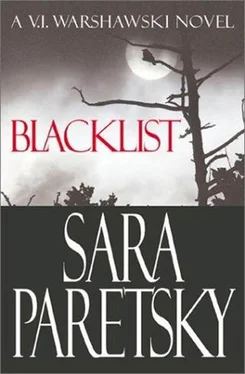In recent years, publications like the Washington Times and the Wall Street journal have tried to change public perception of Taverner, Bushnell and other leading McCarthy era figures. Many on today’s right say that the left damaged the reputations of true patriots, and they have sought to revisit that history. One of the greatest oddities of this attempt at rehabilitation is provided by Edwards Bayard, son of Renee and Calvin Bayard, who jousted with Taverner in front of the House committee. Some years ago, Edwards Genier Bayard joined the ranks of liberal-turned-conservative pundits. He now works for the inf uential Spadona Foundation, the rightwing think tank that has set the agenda for much contemporary political discourse. Our political affairs correspondent Jolynn Parker spoke with Mr. Bayard in his Washington office.
Jolynn’s throaty voice came on, explaining the highlights of Bayard’s career: Ph.D. in economics from the University of Chicago, a stint at the International Monetary Fund running the program to sell Bolivia’s water supply to U.S. and French engineering firms, and now heading the Spadona Foundation’s economic policy division.
“Your father is a legend in liberal political circles. How did he feel about your taking a position with Spadona, which has opposed so many of his policies and politics?”
“We had a number of interesting Christmas dinners,” Bayard said, “but both my parents are great respecters of free speech, as I am, and we all believe there is room in America for many different public opinions.”
“How did your views come to differ so greatly from your father’s?” Jolynn asked.
“It was my work at the University of Chicago, which coincided with the end of the Allende government in Chile; I became convinced that supporting a Communist like Allende-as my parents did-was damaging for U.S. interests there, and not fair to the Chilean people, either.”
“Some people would say that the United States intervening to overturn another country’s election was unfair, especially in light of the many
thousands of people the Pinochet government imprisoned and killed during the eighties.”
Bayard gave a dry laugh. “I’ve heard those complaints many times, Jolynn, but the Chilean economy is stronger today than ever.”
I clicked the stop icon. I wondered what form those interesting Christmas conversations had taken, and why Catherine had adopted her grandparents’ values instead of her father’s, and where her mother was. None of my Web researches gave any private gossip about Edwards’s marriage. I left Nexis and switched to my phone messages.
To my surprise, Geraldine Graham hadn’t called again. However, Amy Blount had phoned to say that Whitby’s housekeeper would come to his house in the morning to let us in.
Darraugh had phoned from New York, just to say he had heard from his mother as well as his PA, Caroline; he had full confidence in my abilities, but he thought we’d put enough energy into his mother’s problems for now.
My answering service has a neat little program that identifies the phone number of incoming calls; they include that in the report they e-mail me. Darraugh was staying at the Yale Club in New York, which tracked him down in the bar.
“What is it? Didn’t you get my message?” he demanded.
“Yes, two minutes ago, and I’ll wrap up my report in the morning. Two things, though: the first is that the dead man’s family has hired me to look into his death, so I will be continuing my inquiries out in New Solway.” “I would rather you didn’t-“
“I’m telling you as a courtesy, Darraugh, because you’re one of my most valued clients. You know I normally never reveal one client’s business to another.” I paused to let him digest that before adding, “The second thing is that I talked to Calvin Bayard’s granddaughter this afternoon. She says Mr. Bayard has a key to Larchmont. Is that possible?”
“Possible? Possible that he has a key to my family’s house? You had damn well not be spreading that story around town.” His anger made the receiver vibrate.
“Darraugh-take it easy. The kid told me he had a key.”
“She’s wrong. She’s lying for whatever reason teenagers lie.” His voice retreated from fury to mere wintriness.
“I see.” I pinched the bridge of my nose, wishing I did see. “I tried to talk to Mr. Bayard, but was soundly rebuffed. Do you know why?”
“Not for any nefarious reason. He’s in poor health; Renee protects him with her usual energy. Send in your bill for the hours you’ve put in on my mother’s complaint. I hope you will remember as you look for this dead man’s murderer that I’ve paid your bills for many years now. I expect you to keep that in mind if you feel your inquiries must take you out to New Solway for any reason. You should realize you could fall into quicksand faster than anyone could get to you to pull you out.”
He hung up before I could say anything. I had known Darraugh Graham for fifteen years, but I had never heard him threaten me before.
Gaps in the Newsreel
Many people saw Olin Taverner as your husband’s greatest enemy, Renee. Can you explain to us why Calvin Bayard continued to see Olin Taverner socially?” Dennis Logan cocked his head at Renee Bayard with an intense sincerity that made her withdraw deeper into her studio chair.
Lotty and I were sitting with Max Loewenthal, watching the interview in the back room where Lotty keeps her television. Max, who’s known Lotty practically her whole life, is the executive director of Beth Israel, where Lotty has her surgical privileges. The two have been lovers for many years, but since last fall they’ve become much closer. In a way, I resented not having Lotty to myself as much as I used to, but I like and respect Max.
Over roast chicken and a bottle from Max’s impressive cellar-which I was still too congested to appreciate-we talked idly about a number of things, including Max’s perennial struggle to find a way to bring more paying patients into the hospital. One of his board members had suggested getting designer hospital gowns for affluent patients.
“Great idea,” I applauded. “How can we really tell we’ve got a two-tier health care system if we don’t have outfits that demonstrate it? Armani in a soft gold silk for the privately insured, gray overwashed nylon for the wretched poor.”
Max laughed, but Lotty wasn’t willing to joke about the matter. She uses
her substantial surgical fees to fund a number of health programs for the un-or underinsured, but she’s acutely aware of how small a drop that is in the health care bucket.
I changed the subject hastily, describing my encounters with young Catherine Bayard. Lotty and Max had immigrated to America from Britain in the late fifties. By the time they’d arrived here, the HUAC hearings had pretty well died down, so she and Max didn’t know the names or histories of the key players, but they were interested enough to follow me to the television after dinner. We turned on the nine o’clock news on Channel 13.
To my surprise, the show started not with Olin Taverner’s death, but with the parents’ meeting at Vina Fields that Catherine had mentioned. I wouldn’t have thought that was newsworthy, but I guess angry rich people shouting at each other makes good theater.
The segment opened with Beth Blacksin standing in front of Vina Fields. “This discreet stone facade hides the entrance to a Chicago power institution. It’s here that Grahams, Bayards, Felittis and other Chicagoans whose names spell clout send their children. It’s a mile from the Cabrim Green housing projects, but a light-year from the turmoil of an inner-city school. No gangs, no guns here. But lately this calm building has itself been caught up in turmoil over whether they’ve been harboring not street gangs, but an international terrorist. Parents and administrators have been anguishing over whether student records, including what books students check out of the library, should be open to law enforcement agencies. At the center of this upheaval is an Egyptian dishwasher, Benjamin Sadawi, who disappeared three weeks ago.”
Читать дальше












